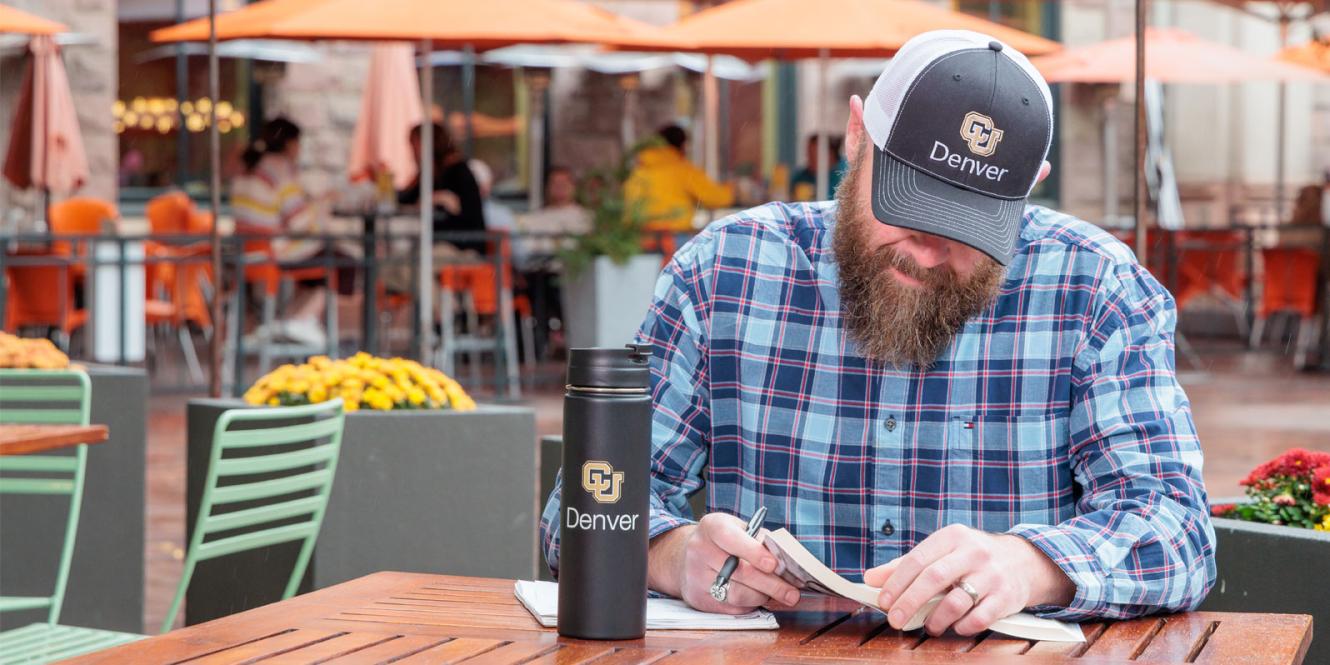
Major in Criminal Justice (Bachelor’s)
Build a meaningful career in law enforcement, criminology, victim advocacy, and more with CU Denver’s fully online Criminal Justice degree.
CU Denver’s online Bachelor of Arts in Criminal Justice develops analytical, problem-solving, and communication skills for addressing complex legal and social issues.
- Learn from experienced faculty who combine academic research with practical field expertise.
- Explore topics including criminological theory, law enforcement strategies, corrections, and victim advocacy.
- Customize your degree with concentrations in Law Enforcement, Victims and Victim Services, or a General Track tailored to your interests.
- Gain valuable interpersonal skills for working with diverse populations.
Graduates are well-equipped to pursue roles in public safety, government, and private sector security.
-
Degree LevelBachelor’s
-
School & CollegeSchool of Public Affairs
-
Total Credit Hours120
-
Class Type100% Online
-
Time CommitmentFull-Time or Part-Time
-
Start Term(s)Fall, Spring, Summer
- Fill out form
- We'll be in touch soon
- Get ready to meet your moment
Program Overview
The Bachelor of Arts in Criminal Justice is offered fully online through CU Denver, which means faculty from the CU Denver campus are your instructors. This flexible program allows you to study at the place and time that works best for you—no need to put your life on pause to earn your degree.
Build Career-Focused Skills
- Relevant knowledge regarding crime and justice
Research skills to help you study problems and design solutions
Critical thinking skills to make informed judgments and contributions
- Effective communication skills for interacting with diverse populations and professional and academic audiences
- Diversity and cultural literacy to evaluate different points of view and appreciate a range of perspectives in your practice

You’ll also learn to identify the social and behavioral contributors to crime and delinquency, understand ethical concerns within criminal justice, study the impact of public policy, and hone your interpersonal and leadership skills.
Start applying what you learn to your current profession immediately—the valuable skills you develop can prepare you to pursue an entry-level position or an advanced degree.
Tuition Breakdown
| Resident | Non-Resident |
|---|---|
| $403* per credit | $623 per credit |
*College Opportunity Fund (COF) rate. To learn more, visit the COF website.
Example Courses
Although many students choose online degrees for the flexibility and the opportunity to complete a degree program at their pace, the online BACJ degree can be completed in four years with a full course load. You also have the option of taking fewer credits and completing the program over more time.
Criminological Theory (CRJU 2041)
This course explores the causes of crime and policies within and outside the justice system to predict, prevent, and correct criminal, delinquent, and deviant behavior.
Corrections (CRJU 4042)
Family Systems and Social Justice (HDFR 4260)
Relying on ecological systems theories, this course introduces families and family systems, exploring how they experience (in)justice in education, community services, and employment.
Criminal Justice Degree Concentrations
Focus your studies in a specific area of study within criminal justice. The BA in Criminal Justice program offers two concentrations and a general track, all offered fully online.
- Police-Community Relations
- Juvenile Delinquency
- Crime Analysis and GIS
Students will take 12 credit hours in law enforcement-specific courses, with 10 courses to choose from such as:
Students take 12 credit hours in courses focused on victimology and other related topics, with two categories of electives: Violence Focus and Professional Setting. The Violence Focus provides a more in-depth study into violence, whereas the Professional Setting courses help students sharpen skills related to professional service, including trauma-informed care, program design, and management.
Students choose three criminal justice elective courses based on their own specific career goals.
Career Outlook
What is the Projected Salary of an Individual Working in Criminal Justice?
Graduates of this program pursue diverse careers across law enforcement, corrections, public policy, and investigative services. Explore potential job titles, salary expectations, and growth projections.
What Can I Do with a Bachelor's in Criminal Justice?
Law enforcement is likely the first career path that comes to mind, but depending on your interests and the focus of your studies, your degree could lead to a wide range of opportunities. In general, jobs are divided into the categories of law enforcement, advocacy and social services, corrections, and security. Below are some of the possible career paths for criminal justice graduates.
One of the benefits of earning a bachelor’s degree in criminal justice is the large number of career options available to graduates. From 2021 to 2031, protective service occupations are projected to grow two percent (2%) according to the Bureau of Labor Statistics (BLS). Protective services are needed in industries such as local and state government, investigation and security services, schools, and more.
After graduating, you could choose to enter a training academy to become an officer if you are not already working in the law enforcement field. With experience and a criminal justice master’s degree, you could also move into supervisory positions or pursue a career with agencies like the FBI.
However, law enforcement isn’t the only option for criminal justice graduates. With your bachelor’s degree, several possibilities open up where you can apply your new skills and knowledge. You could also continue your education to earn an advanced degree and pursue a teaching career. Aside from becoming a police officer, you could explore jobs like:
- Forensic Interviewer
- Crime Analyst
- Victim Advocate
- Substance Abuse Counselor (may require an advanced degree)
- Criminal Profiler
- Investigative Reporter
- Probation or Parole Officer
Admissions

Admission Requirements
Admission requirements and deadlines vary based on the program. In addition, you will have different requirements depending on if you are a first-time student, a transfer student, or an international student.

Get Personalized Support for Your Application
As you consider an online education, we understand that it’s important for you to know that you’re getting a high-quality, affordable, and flexible education that helps you reach your goals. That’s why the CU Denver Enrollment Team is available to offer guidance and answer any questions that you may have about our degree programs, financial aid options, transfer information, admissions requirements, and more.
Frequently Asked Questions
CU Denver’s BA in Criminal Justice can be completed at the same pace as any traditional undergraduate degree, or at your own pace. One of the main benefits of an exclusively online education is flexibility. You can take as many classes as you can fit into your schedule and complete the program at your speed. Though you can complete many of our undergraduate degrees in four years by taking a full course load, you also have the option of taking fewer credits and completing the program over more time.
Online learning offer the flexibility to study at the best place and time for you. You can choose a pace that is sustainable for your lifestyle, which can help you take into account your current career, family, and other commitments outside of school.
Additionally, our online programs are taught by the same faculty who teach on campus, which means you’re earning the same high-quality degree as students on campus, and your diploma will not mention that your degree was earned online.
The BA in Criminal Justice is offered fully online, which means you are not required to take courses at our campus. Our fully online classes are recorded rather than streamed live, so you can learn on your schedule. We welcome students from Denver, Colorado, throughout the United States, and internationally.
A relevant master’s degree can help increase your earning potential and expand your opportunities. CU Denver offers an online Master of Criminal Justice (MCJ) program to help you advance your education. This program offers the option of adding a concentration in Crime Analysis; Disasters, Hazards and Emergency Management; and Emergency Management and Homeland Security. The online Master of Public Administration from CU Denver might also appeal to you if you have career aspirations in local government, environmental policy and management, public policy, non-profit management, emergency management, and other related areas.
Tuition & Financial Aid
Investing in your future is a big decision. However, becoming a fully online student at CU Denver is a high-quality and affordable option for learners of all types. Tuition and fees are based largely on the degree program you enroll in.
Tuition is determined based on which CU Denver program is chosen, undergraduate or graduate level, and your resident status. Visit our tuition and financial aid page for more information.
Financial aid and scholarships are available for those who qualify.
Experience flexible, career-focused programs with CU Denver’s renowned quality—100% online—taught by expert faculty in engaging courses within a supportive community, all at an affordable tuition with financial aid and scholarships available.

Flexible, career-focused programs with the same CU Denver quality—100% online.

Expert faculty, engaging courses, and a supportive online community.

Affordable tuition with financial aid and scholarships for online students.

Take the Next Step
Ready to advance your career in criminal justice? Take the first step toward earning your online degree by filling out the form above for more information or calling us at 303-860-5604.




